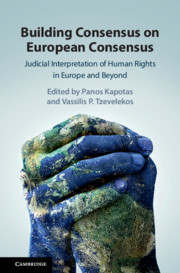Description
Building Consensus on European Consensus
Judicial Interpretation of Human Rights in Europe and Beyond
Coordinators: Kapotas Panos, Tzevelekos Vassilis P.
Presents a critical evaluation of a controversial interpretative tool the ECtHR uses to answer morally/politically sensitive human rights questions.
Language: English
Subject for Building Consensus on European Consensus:
Publication date: 01-2019
500 p. · 15.7x23.5 cm · Hardback
500 p. · 15.7x23.5 cm · Hardback
Description
/li>Contents
/li>Biography
/li>
Should prisoners have voting rights? Should terminally ill patients have a right to assisted suicide? Should same-sex couples have a right to marry and adopt? The book examines how such questions can be resolved within the framework of the European Convention of Human Rights. 'European consensus' is a tool of interpretation used by the European Court of Human Rights as a means to identify evolution in the laws and practices of national legal systems when addressing morally sensitive or politically controversial human rights questions. If European consensus exists, the Court can establish new human rights standards that will be binding across European states. The chapters of the book are structured around three themes: a) conceptualisation of European consensus, its modus operandi and its effects; b) critical evaluation of its legitimacy and of its outputs; c) comparison with similar methods of judicial interpretation in other legal systems.
Preface Christos L. Rozakis; Introduction; 1. How (difficult is it) to build consensus on (European) consensus? Panos Kapotas and Vassilis P. Tzevelekos; Part I. Understanding European Consensus: Meaning, Function, Mechanics, History: 2. European consensus: new horizons Kanstantsin Dzehtsiarou; 3. Consensus in the legitimacy-building era of the European Court of Human Rights Ed Bates; 4. Consensus, stasis, evolution: reconstructing argumentative patterns in evolutive ECHR jurisprudence Christian Djeffal; 5. The consensus argument in NGOs' Amicus Curiae Briefs: defending minorities through a creatively used majoritarian argument Laura Van den Eynde; 6. Determining the content of the European consensus concept: the hidden role of language Jaroslav Větrovský; 7. How the ECtHR's use of European consensus considerations allows legitimacy concerns to delimit its mandate Kristin Henrard; 8. Borges' Pierre Menard, Author of the Quixote and the idea of a European consensus Sionaidh Douglas-Scott; Part II. Appraising European Consensus: Legitimacy and National Divergence: 9. A better signpost, not a better walking stick: how to evaluate the European consensus doctrine Andreas Føllesdal; 10. Constructive consensus and domestic democracy Thomas Kleinlein; 11. The European consensus doctrine and the ECtHR quest for public confidence Or Bassok; 12. Can European consensus encourage acceptance of the European convention on human rights in the United Kingdom? Merris Amos; 13. When to use European consensus: assessing the differential treatment of minority groups by the European Court of Human Rights Dimitrios Kagiaros; 14. When the European Court of Human Rights decides not to decide: the cautionary tale of A, B and C v. Ireland and referendum-emergent constitutional provisions Fiona de Londras; Part III. Consensus Analysis Outside the ECHR System: 15. The Inter-American Court of Human Rights' tentative search for Latin American consensus Lucas Lixinski; 16. National consensus and the eighth amendment: is there something to be learned from the United States Supreme Court Jaka Kukavica; 17. Levels of generality in the comparative reasoning of the European Court of Human Rights and the European Court of Justice: towards judicial reflective equilibrium Jens T. Theilen; 18. Consensus as challenge and retraction of rights: can lessons be drawn from – and for – EU citizenship law? Niamh Nic Shuibhne; Conclusion; 19. Building consensus on European consensus Conor Gearty.
Panos Kapotas is a Senior Lecturer in Law at Portsmouth Law School. His research interests range from Equality and Anti-discrimination law to European Human Rights law and European Union law. He holds a Ph.D. in Law from London School of Economics and Political Science (LSE), an LLM from University College London and a first degree in Law from the Kapodistrian University of Athens. He has published in leading law journals on a range of issues, with a particular focus on equality. He has taught EU law and Human Rights law at the LSE, City University London, School of Oriental and African Studies, University of London, University of Essex and Queen Mary University of London. Dr Kapotas is qualified with the Athens' Bar Association.
Vassilis P. Tzevelekos is a Senior Lecturer in Law at the University of Liverpool School of Law and Social Justice. He is a general international law lawyer with a special interest in human rights protection and has published extensively in these areas. He holds a Ph.D. in International Law from the European University Institute, Florence, where he also did a Master on Legal Research. He studied European Politics at the College of Europe and International Law at Paris 1 Panthéon-Sorbonne. Dr Tzevelekos is qualified with the Athens' Bar Association.
Vassilis P. Tzevelekos is a Senior Lecturer in Law at the University of Liverpool School of Law and Social Justice. He is a general international law lawyer with a special interest in human rights protection and has published extensively in these areas. He holds a Ph.D. in International Law from the European University Institute, Florence, where he also did a Master on Legal Research. He studied European Politics at the College of Europe and International Law at Paris 1 Panthéon-Sorbonne. Dr Tzevelekos is qualified with the Athens' Bar Association.
© 2024 LAVOISIER S.A.S.




